中学牛津译林英语7Aunit4复习课件 (共25张PPT)
文档属性
| 名称 | 中学牛津译林英语7Aunit4复习课件 (共25张PPT) | 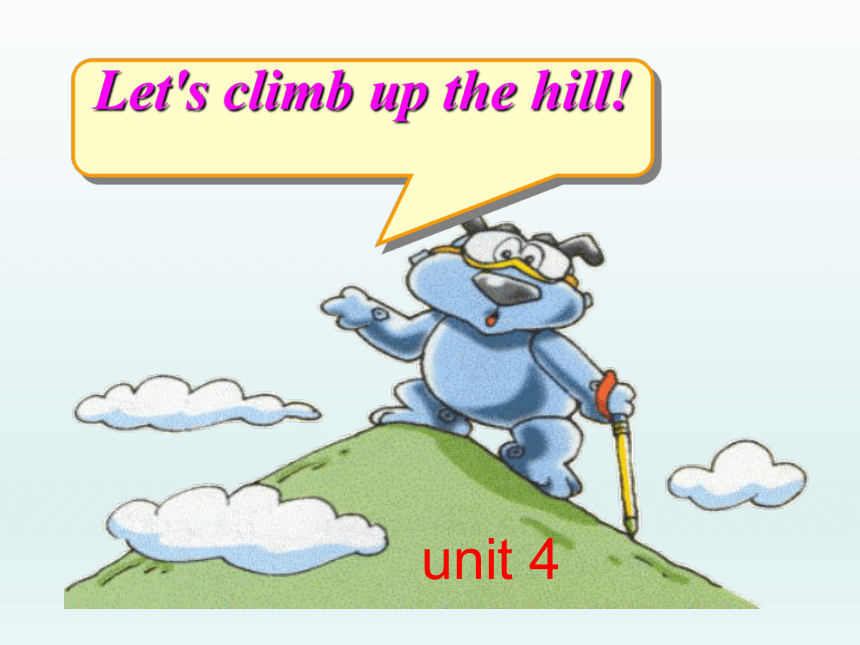 | |
| 格式 | zip | ||
| 文件大小 | 430.6KB | ||
| 资源类型 | 教案 | ||
| 版本资源 | 牛津译林版 | ||
| 科目 | 英语 | ||
| 更新时间 | 2017-08-24 20:48:17 | ||
图片预览

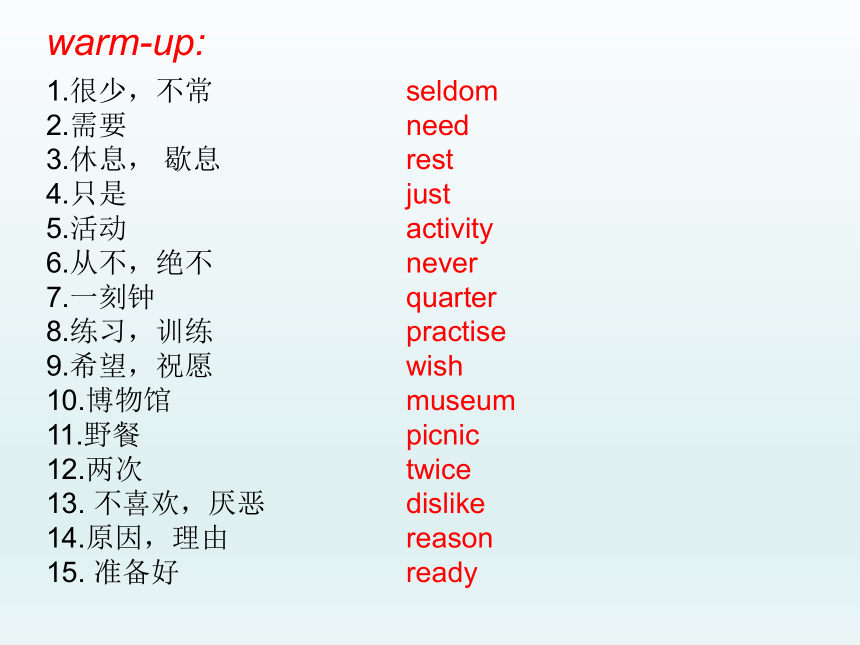
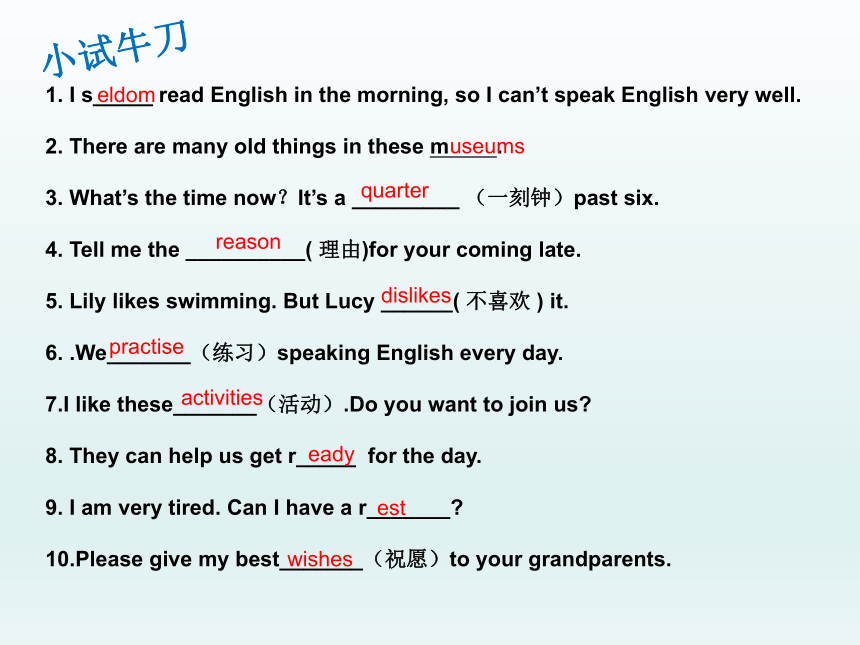

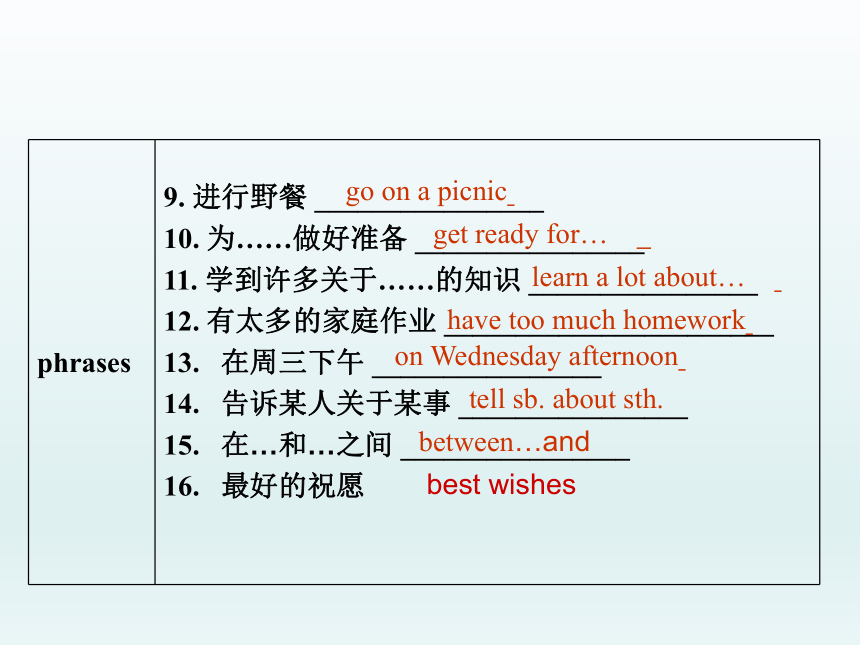

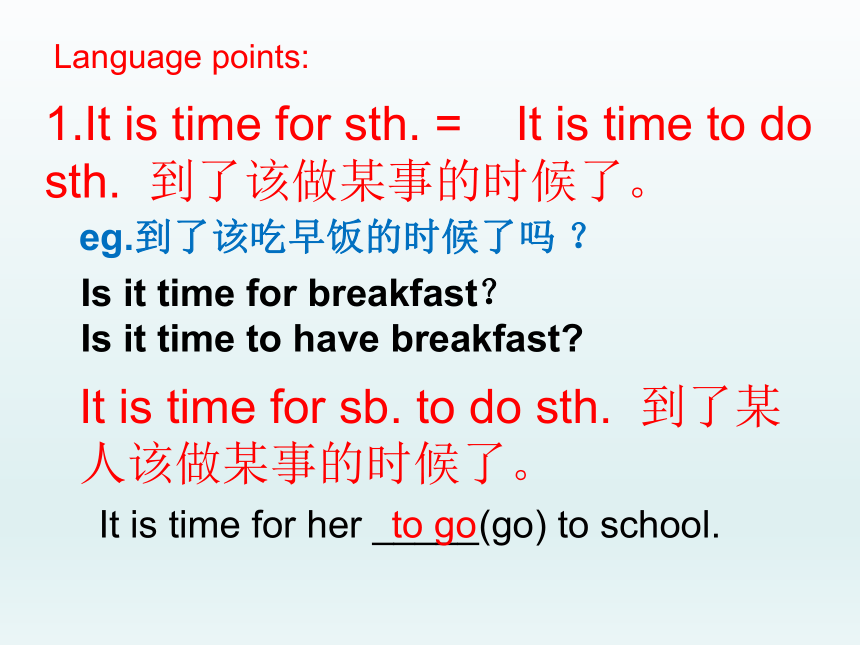
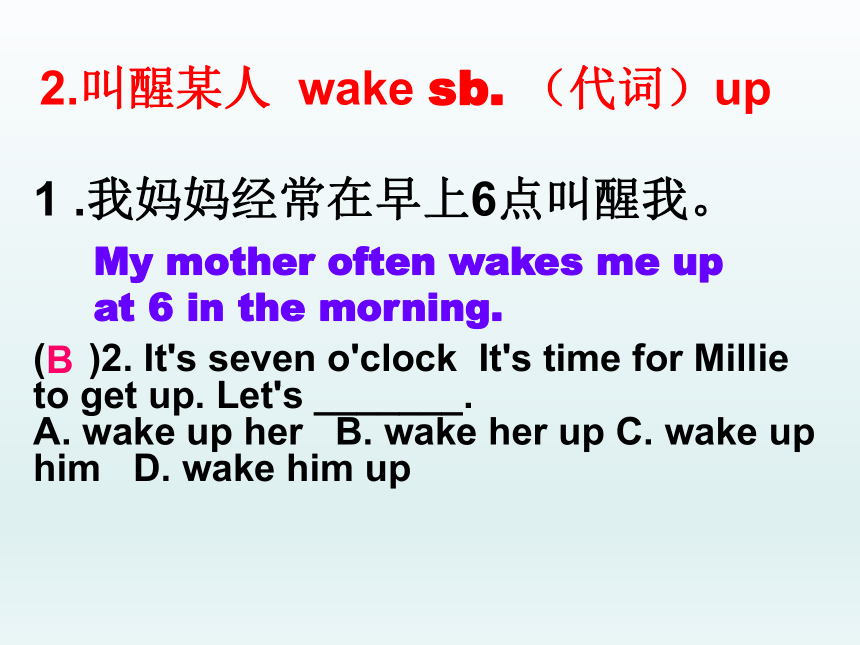
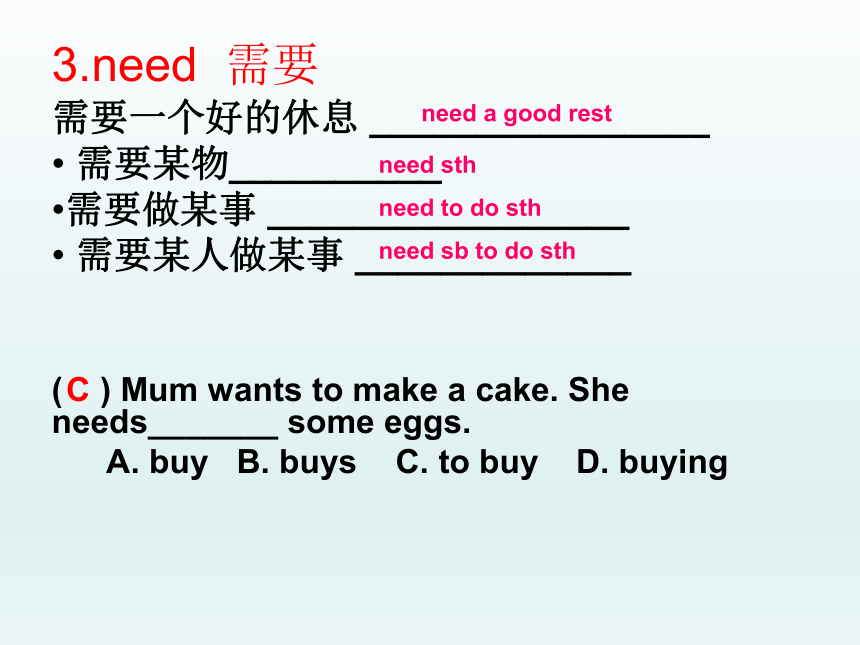
文档简介
课件25张PPT。Let's climb up the hill! unit 41.很少,不常
2.需要
3.休息, 歇息
4.只是
5.活动
6.从不,绝不
7.一刻钟
8.练习,训练
9.希望,祝愿
10.博物馆
11.野餐
12.两次
13. 不喜欢,厌恶
14.原因,理由
15. 准备好
seldom
need
rest
just
activity
never
quarter
practise
wish
museum
picnic
twice
dislike
reason
ready
warm-up:1. I s_____ read English in the morning, so I can’t speak English very well.
2. There are many old things in these m .
3. What’s the time now?It’s a _________ (一刻钟)past six.
4. Tell me the __________( 理由)for your coming late.
5. Lily likes swimming. But Lucy ______( 不喜欢 ) it.
6. .We_______(练习)speaking English every day.
7.I like these_______(活动).Do you want to join us?
8. They can help us get r_____ for the day.
9. I am very tired. Can I have a r_______?
10.Please give my best_______(祝愿)to your grandparents.eldomuseumsquarterreasondislikespractiseactivitieseadyestwishes小试牛刀wake up at weekends all kinds of books borrow books from the library do morning exercises do after-school activities chat with each other twice a month Start to go!go on a picnic get ready for… learn a lot about… have too much homework on Wednesday afternoon tell sb. about sth. between…and best wishesWe continue to go!Language points:1.It is time for sth. = It is time to do sth. 到了该做某事的时候了。
eg.到了该吃早饭的时候了吗 ?
Is it time for breakfast?
Is it time to have breakfast?It is time for sb. to do sth. 到了某人该做某事的时候了。It is time for her _____(go) to school.to go 2.叫醒某人 wake sb. (代词)up
1 .我妈妈经常在早上6点叫醒我。
( )2. It's seven o'clock It's time for Millie to get up. Let's _______.
A. wake up her B. wake her up C. wake up him D. wake him up
My mother often wakes me up
at 6 in the morning. B3.need 需要
需要一个好的休息 ________________
需要某物__________
需要做某事 _________________
需要某人做某事 _____________
( ) Mum wants to make a cake. She needs_______ some eggs.
A. buy B. buys C. to buy D. buying
need sth
need to do sth
need sb to do sthneed a good restC4.have fun 玩得开心
=have a good/great time
=enjoy oneself
1.We always have a good time at school.(同义改写)
We always_____ ______at school.
have fun +doing sth.=have a good/great time +doing sth.
做某事很开心。
( )2. They always have a great time_______ on the phone.
A. chatting B. chating C. to chat D. chat
have funA5.practise v.练习
practise doing sth. 练习做某事
1.What about_____ (practise)______(play) basketball?
2.我们应该练习说英语。
we should practise speaking English.
practisingplayingCome on!6.有时间做某事 have much time to do sth.
1. He doesn’t have much time ___________ (listen) to music from Monday to Friday.
have no time to do sth. 没有时间做某事
2.Sandy has no time________(play) tennis.
( )3. - Do you have much homework ______ every day?
-No, we usually have lots of time ______ after- school activities.
A. to do, doing B. to do, to do C. doing, doing D. doing, to do
to listento playB7.thank sb. for sth. 感谢某人某事
thank sb. for doing sth. 感谢某人做某事
1.Thank you for your_______(help). Thank you for _______(help) me.helphelping8.too much +不可数 太多
too many +可数 太多
much too + 形容词 太…
eg.太多作业 too much homework
太多书 too many books
太开心 much too happy
1.too much , much too
I am________tired(累),but I have_______ homework to do.
( )2. We students should not watch_______ TV or_______ films on weekdays.
A. too much; too much B. too many; too many
C. too much; too many D. too many; too much
much tootoo much c9. be good for 对…有好处
be bad for 对…有坏处
( )1. Doing morning exercises _______ us.
A. are good for B. is good to C. is good for D. are good to
( )2. Don't watch ____ TV every day. It's bad___ your eyes.
A. too many; for B. too much; for C. many too; to D. much too; to
cB9.介词用法口诀:
年、月、日 in in on
星期前面 on 跟上
at 紧跟时间点
年龄前面把手牵
还有三个特殊记
中午(noon)深夜(night) 别忘记
三餐时间(lunchtime)别丢弃
季节前面要用in
早中晚上也可行
前面有了修饰词
on 要代替介词in
圣诞春节用at
有day节日要用on 1.I often get up ___six o’clock. 2.Tom often chats with me _ lunchtime. 3.I began to learn English___8. 4.Children get many presents __Christmas. 5.I read English ___ the morning. 6.My sister was born ____the cold morning of 2nd October. 7. I was born _____ October, too. 8.We skate ____ winter and swim ___ summer. 9.Kate is my friend. She was born _____1999. 10.We don’t have lessons ___ Sundays. at(clock time)at(mealtimes)at(age)at(festivals)in(parts of the day)on(parts of a specific day)in(months)inin(seasons)in(years)on(days)
选用介词at,in,on填空Victory is coming!10.频度副词 (频率由高到低):
always (总是)
usually(通常)
often (经常)
sometimes(有时)
seldom(很少)
never(从不)翻译下列句子
1. 太阳总是从东方升起,西方落下.
The sun ________ rises in the east and sets in the west.
2. 他通常10点钟睡觉.
He _________ goes to bed at ten o’clock.
3. 他上学经常迟到.
He is _________ late for school.
4. 有时他晚饭后去图书馆.
He ___________ goes to the library after supper.
5. 莉莉很少读报.
Lily _________ reads newspaper.
6. 我上学从来不迟到.
I am ________ late for school.
oftensometimesseldomneveralwaysusually1. 频率副词用在be动词、助动词、情态动词后。
It is usually hot in summer.
夏天天气通常是热的。
2. 频率副词用在主要动词前。
My father usually walks home.
我的父亲经常步行回家。 频率副词在句中的位置:1. Tom _____ to work by bicycle.
A. usually go B. go usually
C. usually goes D. goes usually
2. Jerry _________ for school.
A. is usually late B. usually is late
C. is late usually D. goes usually late Congratulations!writing
Millie's likes and dislikes
我喜欢做早操,因为它们对我有好处。它们能帮我为一天做好准备。我也爱读书,因为从读书中我可以了解很多世界上的东西。
我爱学校里的课程。我们的老师很好,课程也很有趣。我还喜欢画画,因为很有趣。
我不喜欢打篮球。我不高,所以打得不好。我们总是有太多的家庭作业,所以我不喜欢。
2.需要
3.休息, 歇息
4.只是
5.活动
6.从不,绝不
7.一刻钟
8.练习,训练
9.希望,祝愿
10.博物馆
11.野餐
12.两次
13. 不喜欢,厌恶
14.原因,理由
15. 准备好
seldom
need
rest
just
activity
never
quarter
practise
wish
museum
picnic
twice
dislike
reason
ready
warm-up:1. I s_____ read English in the morning, so I can’t speak English very well.
2. There are many old things in these m .
3. What’s the time now?It’s a _________ (一刻钟)past six.
4. Tell me the __________( 理由)for your coming late.
5. Lily likes swimming. But Lucy ______( 不喜欢 ) it.
6. .We_______(练习)speaking English every day.
7.I like these_______(活动).Do you want to join us?
8. They can help us get r_____ for the day.
9. I am very tired. Can I have a r_______?
10.Please give my best_______(祝愿)to your grandparents.eldomuseumsquarterreasondislikespractiseactivitieseadyestwishes小试牛刀wake up at weekends all kinds of books borrow books from the library do morning exercises do after-school activities chat with each other twice a month Start to go!go on a picnic get ready for… learn a lot about… have too much homework on Wednesday afternoon tell sb. about sth. between…and best wishesWe continue to go!Language points:1.It is time for sth. = It is time to do sth. 到了该做某事的时候了。
eg.到了该吃早饭的时候了吗 ?
Is it time for breakfast?
Is it time to have breakfast?It is time for sb. to do sth. 到了某人该做某事的时候了。It is time for her _____(go) to school.to go 2.叫醒某人 wake sb. (代词)up
1 .我妈妈经常在早上6点叫醒我。
( )2. It's seven o'clock It's time for Millie to get up. Let's _______.
A. wake up her B. wake her up C. wake up him D. wake him up
My mother often wakes me up
at 6 in the morning. B3.need 需要
需要一个好的休息 ________________
需要某物__________
需要做某事 _________________
需要某人做某事 _____________
( ) Mum wants to make a cake. She needs_______ some eggs.
A. buy B. buys C. to buy D. buying
need sth
need to do sth
need sb to do sthneed a good restC4.have fun 玩得开心
=have a good/great time
=enjoy oneself
1.We always have a good time at school.(同义改写)
We always_____ ______at school.
have fun +doing sth.=have a good/great time +doing sth.
做某事很开心。
( )2. They always have a great time_______ on the phone.
A. chatting B. chating C. to chat D. chat
have funA5.practise v.练习
practise doing sth. 练习做某事
1.What about_____ (practise)______(play) basketball?
2.我们应该练习说英语。
we should practise speaking English.
practisingplayingCome on!6.有时间做某事 have much time to do sth.
1. He doesn’t have much time ___________ (listen) to music from Monday to Friday.
have no time to do sth. 没有时间做某事
2.Sandy has no time________(play) tennis.
( )3. - Do you have much homework ______ every day?
-No, we usually have lots of time ______ after- school activities.
A. to do, doing B. to do, to do C. doing, doing D. doing, to do
to listento playB7.thank sb. for sth. 感谢某人某事
thank sb. for doing sth. 感谢某人做某事
1.Thank you for your_______(help). Thank you for _______(help) me.helphelping8.too much +不可数 太多
too many +可数 太多
much too + 形容词 太…
eg.太多作业 too much homework
太多书 too many books
太开心 much too happy
1.too much , much too
I am________tired(累),but I have_______ homework to do.
( )2. We students should not watch_______ TV or_______ films on weekdays.
A. too much; too much B. too many; too many
C. too much; too many D. too many; too much
much tootoo much c9. be good for 对…有好处
be bad for 对…有坏处
( )1. Doing morning exercises _______ us.
A. are good for B. is good to C. is good for D. are good to
( )2. Don't watch ____ TV every day. It's bad___ your eyes.
A. too many; for B. too much; for C. many too; to D. much too; to
cB9.介词用法口诀:
年、月、日 in in on
星期前面 on 跟上
at 紧跟时间点
年龄前面把手牵
还有三个特殊记
中午(noon)深夜(night) 别忘记
三餐时间(lunchtime)别丢弃
季节前面要用in
早中晚上也可行
前面有了修饰词
on 要代替介词in
圣诞春节用at
有day节日要用on 1.I often get up ___six o’clock. 2.Tom often chats with me _ lunchtime. 3.I began to learn English___8. 4.Children get many presents __Christmas. 5.I read English ___ the morning. 6.My sister was born ____the cold morning of 2nd October. 7. I was born _____ October, too. 8.We skate ____ winter and swim ___ summer. 9.Kate is my friend. She was born _____1999. 10.We don’t have lessons ___ Sundays. at(clock time)at(mealtimes)at(age)at(festivals)in(parts of the day)on(parts of a specific day)in(months)inin(seasons)in(years)on(days)
选用介词at,in,on填空Victory is coming!10.频度副词 (频率由高到低):
always (总是)
usually(通常)
often (经常)
sometimes(有时)
seldom(很少)
never(从不)翻译下列句子
1. 太阳总是从东方升起,西方落下.
The sun ________ rises in the east and sets in the west.
2. 他通常10点钟睡觉.
He _________ goes to bed at ten o’clock.
3. 他上学经常迟到.
He is _________ late for school.
4. 有时他晚饭后去图书馆.
He ___________ goes to the library after supper.
5. 莉莉很少读报.
Lily _________ reads newspaper.
6. 我上学从来不迟到.
I am ________ late for school.
oftensometimesseldomneveralwaysusually1. 频率副词用在be动词、助动词、情态动词后。
It is usually hot in summer.
夏天天气通常是热的。
2. 频率副词用在主要动词前。
My father usually walks home.
我的父亲经常步行回家。 频率副词在句中的位置:1. Tom _____ to work by bicycle.
A. usually go B. go usually
C. usually goes D. goes usually
2. Jerry _________ for school.
A. is usually late B. usually is late
C. is late usually D. goes usually late Congratulations!writing
Millie's likes and dislikes
我喜欢做早操,因为它们对我有好处。它们能帮我为一天做好准备。我也爱读书,因为从读书中我可以了解很多世界上的东西。
我爱学校里的课程。我们的老师很好,课程也很有趣。我还喜欢画画,因为很有趣。
我不喜欢打篮球。我不高,所以打得不好。我们总是有太多的家庭作业,所以我不喜欢。
同课章节目录
- 预备课程
- Lesson 1 Nice to meet you !
- Lesson 2 A happy family
- Lesson 3 A nice school
- Lesson 4 You look cool !
- Lesson 5 Wonderful things
- Lesson 6 Have nice food
- Lesson 7 Enjoy our days
- Lesson 8 Let's have fun !
- Unit 1 This is me
- Unit 2 Let's play sports
- Unit 3 Welcome to our school
- Unit 4 My day
- Unit 5 Let’s celebrate
- Unit 6 Food and lifestyle
- Unit 7 Shopping
- Unit 8 Fashion
